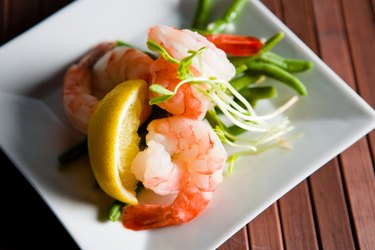
While seafood is often seen as a healthy food overall, certain fatty fish like salmon, tuna, and sardines are promoted specifically for their anti-inflammatory omega-3 properties. Shellfish such as shrimp, however, usually do not make that list. In addition to being high in cholesterol, seafood actually might bring on, or exacerbate, a form of arthritis called gout.
Editor's note: This article was medically reviewed by George Krucik, MD.
Video of the Day
Video of the Day
Gout is the most common form of inflammatory arthritis in men, affecting approximately 3.4 million in the United States alone.
New England Journal of Medicine, a 2004 study.
General Symptoms of Arthritis
Arthritis is an inflammation of the joints. It may affect one or more joints and may be a short-term or long-term condition. It can be very painful, with symptoms such as:
• Pain • Swelling • Stiffness (especially in the morning) • Limited movement • Redness of the skin around the joint • Warmth around the joint
Gout
Gout is the most common form of inflammatory arthritis in men, affecting approximately 3.4 million in the United States alone (New England Journal of Medicine, 2004). It occurs when uric acid builds up in the blood. Uric acid crystals form, resulting in joint inflammation. It may be chronic, with multiple flare-ups over time affecting one or more joints, or acute, typically affecting one joint.
Symptoms of gout include:
• Sudden pain that often develops in the night and may feel throbbing or crushing • Red, warm, and/or tender joints • Occasionally a fever
The attack may subside after a few days, but the chances of having another are about 50 percent. Some people may develop chronic gout, which can lead to stiffness and decreased range of motion.
Certain conditions that may increase your risk of developing gout include:
• Diabetes • Obesity • Kidney disease • Sickle cell anemia (and other types of anemia) • Leukemia and other blood cancers
High-protein foods have also been linked to an increased risk of gout. Those with gout are generally advised to avoid purine-rich foods, such as:
• Meat • Seafood • Purine-rich vegetables such as peas, beans, lentils, spinach, mushrooms, and cauliflower • Animal protein
Research
A 2004 study looked at the intake of meat, seafood, and dairy regarding their risk of gout. Over a 12-year study period, researchers followed 47,150 men from the Health Professionals Follow-Up Study with no history of gout and noted new cases, using a questionnaire to determine whether participants met the American College of Rheumatology survey criteria for gout.
Diet was assessed every four years via a food-frequency questionnaire. During the study, 730 new cases were confirmed. Higher intakes of meat and seafood were associated with increased risk, while higher intakes of dairy were tied to a lower risk of developing gout.
The Bottom Line
You don't have to swear off shrimp or shellfish completely, but keeping intake moderate in the context of a balanced diet that also includes dairy may be beneficial. And keep eating your veggies. Always remember to check with your doctor before making any dietary or lifestyle changes.
About the Author
Jessica Cording is a health and nutrition writer and has a MS in Nutrition and Dietetics.
Is this an emergency? If you are experiencing serious medical symptoms, please see the National Library of Medicine’s list of signs you need emergency medical attention or call 911.